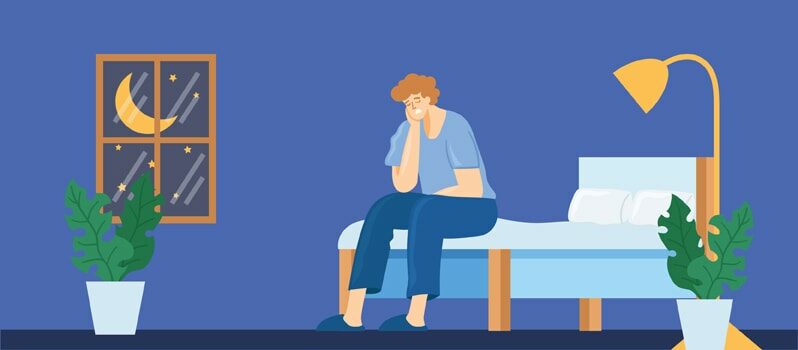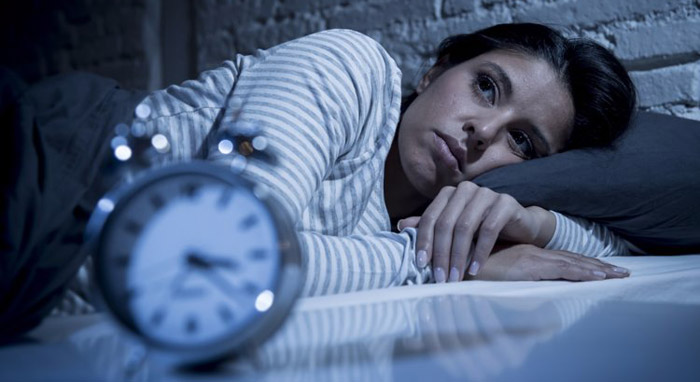Can You Survive Without Sleeping? How Long Can We Stay Awake?

Sleep deprivation can lead to a number of side effects. It can affect your appetite, including a desire for high-calorie foods that could result in weight gain. There are other effects, but before discussing these can you survive without sleeping? How long can we stay awake before suffering physical and mental issues? Here we shall discuss how long it is possible to stay awake and the effects of sleep deprivation.
First of all, the answer to the first question, Can you survive without sleeping? Is NO! You cannot survive if you never sleep at all. There are several stages of sleeplessness or sleep deprivation. Initially, you will feel tired after pulling an all-nighter. However, if you go into a second night without sleep, then this will affect you physically and mentally. In fact, physical degradation will likely start early evening after your first night awake.
In spite of all this, as we shall discuss later, a lack of sleep doesn’t kill you. It’s the consequences of sleeplessness that could achieve that. So let’s have a look at some effects of sleep deprivation.
Here are some of the physical and mental effects of going without sleep. Our start point for the timings is the morning of Day 1 or zero hours. Now we go forward to staying awake for:
Perhaps this is to revise for an exam the following day. The reason is irrelevant – you will not be sleeping at all tonight. You expect to feel tired the following day after having missed an entire night of sleep. However, are you also prepared for your memory to fail you, the poor judgment and decision-making that might puzzle you, finding it difficult to pay proper attention to your surroundings and people talking to you, becoming more emotional, and perhaps failing that exam? All of these are common side effects of going just one night without sleep. So that’s your starting point for the way you are likely to be affected when you stay awake all night.
Your health begins to decline after 36 hours of being awake. The occasional all-nighter will not harm you, but if you frequently stay awake for 36 hour periods, it could lead to high blood pressure and cardiovascular issues. Your hormones may become imbalanced, leading to any number of emotional problems.
Today you are highly likely to experience strange effects. You will likely suffer blackouts of up to about half a minute without knowing it, which may manifest as you suddenly being unaware of where you are or what you are doing. These blackouts, known as ‘microsleeps,’ can last any time up to around 30 seconds. They can be very disorienting because you won’t know what has happened. Imagine doing something, and then suddenly it’s half a minute forward in time! What just happened?
You stay awake over three nights, totaling 72 hours. Now you are beginning to slide mentally. After 3 days you will begin to hallucinate. Concentration will be extremely difficult and simple tasks like talking to somebody will become difficult. You will not be able to recognize the emotions of others, leading to potentially difficult situations. Your judgment will be impaired and you will make mistakes in whatever you are doing. You may become depressed and anxious, and paranoia could well set in. You certainly don’t want to be driving at this time, or even crossing a road by foot! A fatal accident could be just around the corner!
After the third day, while you will find it difficult to stay awake, your insomnia will then seriously affect your brain. You will be likely to become hallucinatory, see things that aren’t there, misinterpret what you do see and you may also find it difficult to have a conversation with others. In addition to the onset of high blood pressure and cardiovascular disease, you will likely find your memory failing. You are also more likely to have a fatal accident.
A 2014 study on the impact of sleep deprivation on food desire in the human brain showed a correlation between sleep deprivation and obesity. Those that go without sleep for even one night developed a greater appetite than those who slept normally. They also developed an increased need for food, one conclusion being that those deprived of sleep tend to put on weight. Not only that, but the type of food craved for by those who have gone without sleeping for a day or more tend to be high in calories and therefore fattening.
This craving indicates that, to an extent, you can survive physically without sleeping because your body continues to demand food. In such cases, it is better to avoid foods rich in fats or fatty proteins (cheese, marbled steaks, ) and replace them with lean proteins (chicken, turkey, beef with fat trimmed off, shellfish, tofu, nuts). Continuing to eat fatty foods under sleep-deprived conditions can rapidly lead to obesity.
So can you survive without sleeping and drinking? Absolutely not! You should drink plenty of fluids if you are to survive without sleep. Women need 72 fluid ounces of water daily (or 9 average 8 oz cups) and men 104 fl oz (cups). Pregnant and breastfeeding women need more (10 and 13 cups respectively.) Click the link above for children’s requirements. Dehydration can lead to very serious health issues.
How long can we stay awake for before we fall into a sleep or state of unconsciousness? There are two recorded instances of men staying awake for 264 and 266 hours (a 17-year-old Californian and a 42 year- old Cornishman resp.) in attempts to be included in the Guinness Book of Records. This publication no longer includes this as a category. These are extreme examples, and it is highly recommended that nobody tries to stay awake for that length of time.

Back in 1958, DJ Peter Tripp decided to broadcast his radio show for 200 continuous hours without sleep for charity. He increased in irritability sometime around the third day. One effect of sleeplessness can be an increase in stress hormones which can cause irritability. As his period without sleeping increased, Tripp began to lose touch with reality, and experienced hallucinations such as seeing spiders in his shoes, and kittens all over his studio. When he went to his hotel room during his show to change clothes, he spotted a drawer in his hotel room bursting into flames, even though it did not.
This experience led analysts to believe he had entered an REM state while still awake. This is a stage of sleep where the mind is most active and imaginative, and when dreams and even nightmares are experienced. Could he have done so? Perhaps, although there are not a lot of subjects willing to try to stay awake for 11 days! Even after 5 days of sleep deprivation, you can become neurotic and psychotic.
So how long can we stay awake? About 3 days or 72 hours without sleeping is the limit for most people. After that, the urge to sleep is too powerful for you withstand. Sure, some individuals can go much longer than that as we discussed above, but after 3 days your thought processes begin to go awry! Multitasking becomes difficult, and it is very difficult to focus on any task you are carrying out.
Some people ask themselves that question. Can you die if you don’t sleep, and how long can you go without sleep before you die? In fact, a lack of sleep itself won’t kill you, but a lack of judgment, reduced alertness, and poor decision making could lead to decisions or actions that may result in an accident that could easily be fatal. You must certainly not try to drive after even one night without sleep. If you work in a hazardous area or at a height such as a steeplejack, with electrics, chemicals or even work as a zookeeper, do not even try to go to work!
Another potentially fatal issue is the overall effect of sleeplessness on your body. If they are not permitted to rest, your major organs and even some minor ones may begin to slow down in their function and perhaps even ultimately shut down, resulting in death. Some areas of your brain will also degenerate. So never underestimate the power of sleep.
Some people cannot sleep even if they want to. Their sleep deprivation is not voluntary! A restless night is unlikely to harm you, but if this goes into two nights or even three, then you need to do something about it. Here are some suggestions that should help you get a good night’s sleep.
So, can you survive without sleeping? Can you die if you don’t sleep? Yes and no! While sleep deprivation will not kill you, the side effects might. Among these are depression, hallucinations, blackouts, paranoia, a state of ‘unreality’, the breakdown of major organs, etc., etc. It is important that you avoid going more than one night without sleep at a time.
If you have issues sleeping, then there are solutions to this in the form of preparing properly for bedtime getting some soothing sounds to lull you to sleep and acquire more comfortable bedding. Each of this is what to do if you can’t sleep – and they tend to work!
Donald Edwards is a sleep research expert with a deep knowledge of sleep and sleeping difficulties. He is a senior writer whose expertise and compassionate approach to establishing the fundamental causes of your sleeping issues enables us to help you to get the best night’s sleep possible and wake up fully refreshed for the day to come.
Medical Disclaimer: By using the insidebedroom.com website and/or purchasing any products or services through this website, you are voluntarily agreeing to this Disclaimer. You are agreeing that you have read, understand, and consent to the terms herein.
The information and other content found on this website, or in any linked references, are not intended to be expert medical advice and should not be construed as such. No information on this site, including written text, images, graphics and any other form of information, is intended to be a substitute for professional medical advice, treatment or diagnosis, but is intended for informational purposes only. If you need any form of medical advice or information, then refer to your physician or other medical expert.
Illia says
Hello Donald,
Thank you for your research on this topic. I believe that many youngsters don’t take sleep as seriously as they should in our day and age. Sleep is a crucial part of our life, and we should not forget about real health issues that come with the absence of sleep.
It is quite odd that many people may neglect sleep for a couple of extra hours of entertainment or something even more trivial.
By chance, have you heard of lucid dreaming? I feel like this topic is worth mentioning to the people that may think they waste their time sleeping. The practice is fairly difficult, but some achieve living quite the interesting life in their dreams with an ability to do borderline anything.
Great article!